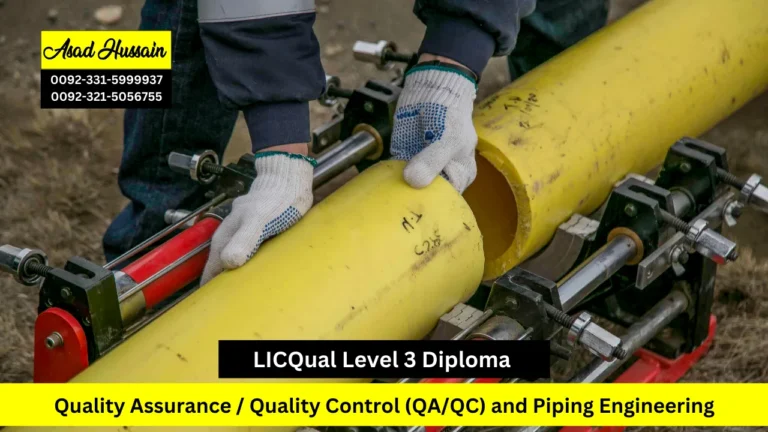The LICQual Level 6 Diploma in Healthcare Administration is a prestigious and career-focused qualification designed to prepare professionals for leadership and management roles in the global healthcare industry. In today’s rapidly advancing healthcare environment, effective administration plays a vital role in ensuring efficiency, quality patient care, and organizational sustainability. This diploma provides learners with a comprehensive understanding of healthcare systems, policy implementation, and administrative strategies essential for managing modern healthcare facilities.
LICQual Level 6 Diploma in Healthcare Administration aims to develop learners’ strategic, analytical, and managerial skills, enabling them to make informed decisions and lead healthcare organizations effectively. It covers key areas such as healthcare management, policy development, financial planning, human resource administration, and performance improvement. Through the LICQual Level 6 Diploma in Healthcare Administration, learners gain the ability to manage complex healthcare operations and contribute to policy formation that aligns with international healthcare standards.
This qualification blends theoretical knowledge with practical application, helping learners address real-world challenges faced by healthcare administrators. Participants will engage with case studies, management projects, and applied research to develop the confidence and problem-solving abilities required for administrative excellence. The course enhances leadership skills, communication proficiency, and the ability to manage healthcare resources effectively.
Graduates of the LICQual Level 6 Diploma in Healthcare Administration will be equipped to pursue senior roles such as healthcare managers, hospital administrators, and departmental leaders. The program also provides a strong foundation for progression into advanced studies, such as a Level 7 Diploma or a Master’s in Healthcare Management.
By completing this diploma, learners will gain the professional competence and global recognition needed to drive innovation, efficiency, and quality improvement in healthcare organizations. This qualification empowers individuals to shape the future of healthcare administration with confidence and strategic insight.
Program Highlights
Mandatory Units
- Healthcare Administration Principles
- Strategic Healthcare Management
- Healthcare Law, Ethics, and Governance
- Financial Management in Healthcare
- Quality Assurance and Risk Management
- Healthcare Project and Change Management
The LICQual Level 6 Diploma in Healthcare Administration is an advanced and globally recognized qualification designed for professionals aspiring to lead, manage, and innovate within the healthcare sector. As healthcare systems evolve and become more complex, the demand for skilled administrators capable of managing operations, resources, and compliance continues to grow. This qualification provides an in-depth understanding of healthcare leadership, governance, policy management, and strategic operations—preparing learners to take on senior administrative roles that drive organizational excellence and patient-centered care.
Age Requirements
- Applicants must be at least 18 years old at the time of enrolment.
- Candidates under 18 may be considered only with written parental or guardian consent and evidence of exceptional academic ability and professional maturity suitable for higher-level study.
Educational Requirements
- A minimum of a Level 5 qualification (or equivalent) in healthcare management, business administration, or a related discipline is required.
- Applicants holding degrees or diplomas in nursing, healthcare operations management-related fields are encouraged to apply.
- Learners with substantial professional experience but without formal qualifications may also be considered on a case-by-case basis.
Professional Experience
- Ideally, applicants should possess 2–3 years of relevant work experience in healthcare administration, hospital management, or public health services.
- Experience in roles involving healthcare operations, policy implementation, or leadership will strengthen the learner’s foundation for success in this program.
- Practical exposure to staff management, financial planning, or healthcare governance is highly beneficial.
English Language Proficiency
- Proficiency in English reading, writing, and communication is essential for academic success in this qualification.
- International learners must provide evidence of English language competency through recognized assessments such as IELTS (minimum overall score of 6.0) or equivalent qualifications.
- Applicants who have previously completed studies in English-medium institutions may be exempted from this requirement.
Learners who meet these entry requirements will be well-prepared to excel in the LICQual Level 6 Diploma in Healthcare Administration, gaining advanced knowledge and strategic skills essential for managing healthcare systems and leading multidisciplinary teams. This qualification offers a strong pathway toward career advancement and further academic progression, such as the LICQual Level 7 Diploma in Healthcare Management or an MBA in Healthcare Administration, enabling learners to enhance their leadership potential, global recognition, and contribution to the efficiency and quality of healthcare organizations.
The LICQual Level 6 Diploma in Healthcare Administration provides learners with advanced knowledge and professional skills required to lead, manage, and improve healthcare organizations in today’s dynamic global environment. This qualification is designed to prepare individuals for senior administrative and managerial roles within healthcare systems, hospitals, public health agencies, and medical organizations. By mastering the principles of healthcare administration, learners will gain the ability to manage operations strategically, ensure compliance, and drive sustainable healthcare excellence. The following learning outcomes outline the specific competencies learners will achieve across each unit.
Healthcare Administration Principles
- Understand the fundamental principles, concepts, and frameworks that underpin effective healthcare administration and management.
- Analyze the structure, function, and interrelationships of healthcare systems, organizations, and regulatory bodies.
- Apply administrative and operational management strategies to improve healthcare service delivery and organizational performance.
- Evaluate leadership approaches, decision-making processes, and communication techniques used in healthcare management.
- Demonstrate the ability to manage healthcare operations efficiently while maintaining a focus on patient safety, ethical conduct, and professional accountability.
Strategic Healthcare Management
- Develop strategic planning and implementation skills tailored to healthcare organizational needs.
- Assess internal and external factors influencing strategic decisions, including policy, finance, and workforce considerations.
- Formulate and execute long-term strategies that enhance operational performance, patient outcomes, and resource optimization.
- Apply analytical tools such as SWOT and PESTLE analysis to evaluate and improve healthcare management practices.
- Integrate innovation and evidence-based management techniques into strategic healthcare operations.
Healthcare Law, Ethics, and Governance
- Demonstrate a comprehensive understanding of legal frameworks governing healthcare organizations and professional practice.
- Apply ethical principles and decision-making models to complex healthcare scenarios and policy issues.
- Ensure compliance with local, national, and international healthcare regulations, including data protection and patient rights.
- Evaluate the role of governance structures in promoting transparency, accountability, and ethical integrity within healthcare institutions.
- Develop policies that reflect ethical standards and legal obligations in administrative and clinical contexts.
Financial Management in Healthcare
- Understand the principles of healthcare finance, budgeting, and resource allocation.
- Apply financial planning and cost control techniques to improve the efficiency and sustainability of healthcare services.
- Analyze financial statements and performance reports to support evidence-based decision-making.
- Evaluate investment and funding options for healthcare development and expansion.
- Demonstrate the ability to balance financial responsibility with patient-centered care and organizational objectives.
Quality Assurance and Risk Management
- Identify and apply quality management frameworks and performance improvement methodologies in healthcare settings.
- Evaluate risks associated with healthcare operations and develop strategies to mitigate them effectively.
- Implement auditing, monitoring, and continuous improvement processes to maintain regulatory compliance.
- Promote a culture of safety, accountability, and excellence within healthcare organizations.
- Utilize data-driven analysis and key performance indicators (KPIs) to measure service quality and operational effectiveness.
Healthcare Project and Change Management
- Plan, design, and implement healthcare projects aligned with organizational goals and healthcare policy standards.
- Apply project management tools and methodologies, including risk assessment, budgeting, and scheduling.
- Lead organizational change initiatives that enhance healthcare efficiency, innovation, and staff engagement.
- Evaluate project outcomes and develop strategies for continuous improvement and sustainability.
- Demonstrate leadership and communication skills essential for managing multidisciplinary teams during transformation initiatives.
Upon completion of the LICQual Level 6 Diploma in Healthcare Administration, learners will possess the knowledge, leadership capabilities, and analytical expertise required to oversee complex healthcare operations. Graduates will be prepared to assume senior roles in healthcare administration, policy development, and strategic management, contributing to the advancement of healthcare quality, efficiency, and global best practices. This qualification also serves as a strong foundation for progression into Level 7 Diplomas or advanced postgraduate programs in healthcare management and leadership.
The LICQual Level 6 Diploma in Healthcare Administration is an internationally recognized qualification designed for professionals aiming to lead, manage, and innovate within the global healthcare sector. In today’s fast-evolving healthcare environment, skilled administrators are essential for ensuring operational efficiency, regulatory compliance, and quality patient care. This diploma provides advanced knowledge and strategic insights into healthcare management, enabling learners to develop strong leadership, organizational, and analytical abilities. It prepares individuals to take on senior administrative roles and drive excellence across healthcare systems at local, national, and international levels.
Healthcare Administrators and Senior Managers
• Professionals aiming to enhance their expertise in healthcare management, policy implementation, and administrative leadership.
• Senior managers responsible for planning, organizing, and supervising healthcare operations.
• Individuals seeking to strengthen decision-making skills in complex healthcare environments.
• Learners focused on integrating management theory with practical administrative applications.
• Administrators committed to improving patient outcomes, efficiency, and organizational sustainability.
Hospital Directors and Healthcare Executives
• Hospital directors and healthcare executives managing large-scale operations and multidisciplinary teams.
• Professionals overseeing hospital departments and services seeking to enhance operational effectiveness.
• Executives aiming to develop strategic planning and governance capabilities for healthcare institutions.
• Learners dedicated to aligning organizational goals with healthcare policies and patient-centered values.
• Leaders responsible for improving institutional reputation, compliance, and service delivery standards.
Policy Makers and Healthcare Strategists
• Policy advisors and strategists developing effective frameworks for healthcare governance and public health improvement.
• Individuals seeking to shape healthcare policy and ensure compliance with international healthcare regulations.
• Professionals applying data analysis, evidence-based decision-making, and policy evaluation techniques.
• Learners motivated to design healthcare systems that promote accessibility, efficiency, and quality.
• Advisors dedicated to advancing healthcare reform, innovation, and sustainable system development.
Supervisors and Departmental Leaders
• Supervisors overseeing healthcare operations who wish to strengthen their leadership and management skills.
• Departmental heads responsible for ensuring policy compliance and operational excellence within healthcare facilities.
• Professionals applying performance management tools to improve departmental productivity and accountability.
• Individuals developing strategies for staff motivation, collaboration, and continuous improvement.
• Leaders focused on integrating innovation, governance, and risk management in healthcare operations.
Healthcare Practitioners in Administrative Roles
• Doctors, nurses, and allied health professionals transitioning into healthcare administration and management.
• Practitioners seeking to combine clinical expertise with administrative efficiency and leadership.
• Health professionals aiming to improve coordination between medical teams and administrative departments.
• Learners interested in developing managerial and organizational competencies for healthcare leadership.
• Clinicians aspiring to influence policy, budgeting, and strategic planning within their institutions.
Career-Focused Learners and Future Healthcare Leaders
• Individuals aspiring to build high-level careers in healthcare management, hospital administration, or public health leadership.
• Learners seeking academic progression to qualifications such as the LICQual Level 7 Diploma in Healthcare Management or related postgraduate degrees.
• Career-driven professionals enhancing their credentials in healthcare policy, strategy, and operational excellence.
• Learners motivated to apply advanced leadership and management techniques in healthcare organizations.
• Professionals committed to achieving organizational transformation and improved healthcare delivery worldwide.
The LICQual Level 6 Diploma in Healthcare Administration is the ideal qualification for individuals who aim to excel in healthcare leadership and administrative management. It equips learners with the strategic, financial, and organizational skills essential for managing complex healthcare systems effectively. Graduates will be prepared to take on senior roles in hospital management, healthcare policy, and public health administration, contributing to innovation, efficiency, and patient-centered care across the healthcare industry globally.







